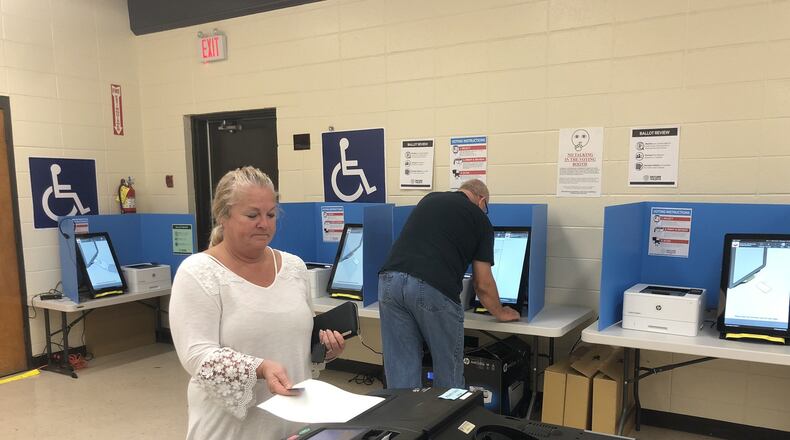Voters and election officials say the first trial of Georgia’s new voting machines has gone smoothly so far, but the real test will come during a high-turnout election when the machines are rolled out statewide.
There were 9,031 voters in six pilot counties who cast ballots on the new voting system, which uses touchscreens and printed-out paper ballots, during in-person early voting, which ended Friday.
Voters in the rest of the state are still using the state's 17-year-old electronic voting machines one last time in Tuesday's local elections.
There were several minor problems in the six test counties: Bartow, Carroll, Catoosa, Decatur, Lowndes and Paulding.
A ballot got stuck as it was being scanned. Poll workers had to be reminded to turn on a power supply for the ballot printers. Some poll workers needed help setting up the equipment that programs voter access cards, which tell voting machines which ballot to display.
“The first time someone interacts with something, there’s going to be a few challenges,” Bartow Elections Supervisor Joseph Kirk said. “Everything was pretty clear once we looked at it. I’ve had no complaints so far. Everyone seems to be very pleased. It’s a very intuitive process.”
Voters at the Cartersville Civic Center in Bartow County, about 45 miles north of Atlanta, praised the new voting system, saying they appreciated the familiarity of voting on a touchscreen combined with the addition of a paper ballot.
“I like that it’s printed out,” Delores Garnigan, a retired BellSouth operator, said after voting Thursday. “It makes you sure that your ballot is going through.”
The printed ballots will include bar codes that encode voters’ choices for tabulation by scanning machines. The printed text of voters’ choices will be used for recounts and audits.
“If they ever have to do a recount, they have a paper to do it. It takes away any guessing about what’s going on,” said voter Billy Watkins, a retiree who lives in Cartersville. “It doesn’t add any time, and it leaves a paper trail.”
Critics of the state's new $107 million voting system, manufactured by Denver-based Dominion Voting Systems, say it's providing little more than a false sense of security.
The test run in this year’s low-turnout municipal elections can’t compare to the stresses that will be placed on the voting system during the March 24 presidential primary, when it will be used by all voters who cast ballots on Election Day, said Aileen Nakamura, a Sandy Springs resident who wants the state to switch to paper ballots filled out by hand.
She organized a group of election observers to watch how the new voting machines performed, and they are reporting their findings to the Coalition for Good Governance, an election security organization that's suing the state and seeking hand-marked paper ballots.
The election observers saw that many voters didn’t check their printed-out ballots for accuracy, meaning those ballots won’t be meaningful source documents for audits and recounts, she said.
“We’re pretty much the guinea pigs right now, and even then it’s not a very good test,” Nakamura said. “Whenever you’re depending on machines, there are so many issues that you have to worry about, whether it be malfunction, programming errors or hackability.”
Secretary of State Brad Raffensperger said the new voting system is secure, and it has performed well in this initial test.
“Voters and poll workers are enthusiastic about how easy it is to use and how well it works,” Raffensperger said. “The rollout to the rest of the state for the March 24 presidential preference primary will go just as smoothly.”
In one test county, Lowndes County near the Florida border, voters overwhelmingly approved of the new system, Elections Supervisor Deb Cox said.
“They love having a piece of paper in their hand that they can check and do it again if they need to,” Cox said. “It’s one of the best things to happen to elections in a long time.”
She said several voters decided to change their choices after reviewing their printed-out paper ballots. Cox said poll workers wrote “spoiled” across the ballots, and voters were then able to create a new ballot that they could recheck and then insert into scanning machines for tabulation.
In Cobb County, voters have been filling out paper ballots with pens and then inserting them into scanning machines. This test of hand-marked paper ballots was ordered by U.S. District Judge Amy Totenberg as a backup plan in case the new voting system isn't ready in time for the presidential primary.
Hand-marked paper ballots introduced human error to the process, Cobb Elections Director Janine Eveler said. Election workers had to pre-print 73,000 paper ballots with about 16 different combinations of candidates. Poll workers gave several voters the wrong ballots before realizing their mistakes.
“I’m not in favor of having to print every ballot for every possible voter,” Eveler said. “It would be challenging to use hand-marked paper ballots statewide, with the logistics of transporting all the ballots where they need to be.”
About the Author
Keep Reading
The Latest
Featured



